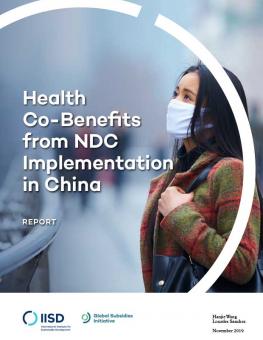
Health Co-Benefits from NDC Implementation in China
This report summarizes the policy efforts that the country is undertaking to meet its NDC targets and the related expected health co-benefits, based on recent scientific literature. It compares public budget allocations to health, climate change-related measures and subsidies to fossil fuels.
-
If NDC targets are achieved in #China, recent research estimates that between 225,000 and 368,000 premature deaths could be avoided in 2050.
-
Research shows that the health co-benefits of achieving NDC targets in #China are higher than the cost of implementing #climate policies.
-
In 2017, fossil fuel subsidies in #China represented around 19% of the budget allocation to health and 48% of the general budget to environmental protection.
Key Messages
- China has shown strong determination to shift to a low-carbon economy through a series of initiatives and commitments, such as its Nationally Determined Contribution (NDC) commitment to peaking its greenhouse gas (GHG) emissions by around 2030; its commitment to phase out inefficient fossil fuel subsidies as part of the G20 and the definition of a reform plan to achieve this in their self-review to fossil fuel subsidies; and Premier Li Keqiang’s 2017 pledge to “make the skies blue again” by tackling air pollution.
- These commitments have an important impact on Chinese health, as climate change and air pollution are a recognized cause of several serious non-communicable diseases, including cardiovascular and respiratory diseases, cancer, malnutrition and other diseases linked to the fallout from natural disasters.
- China already has a large set of policies in place that are aligned with the country’s NDC targets. If NDC targets are achieved, recent research models estimate that between 225,000 and 368,000 premature deaths could be avoided in 2050, and research shows that the health co-benefits are higher than the cost of implementing climate policies.
- However, subsidies to fossil fuels in China still remain a main environmental challenge and have an important opportunity cost. They also have an associated cost of USD 1.79 trillion due to externalities (mostly health and climate change costs).
Over the past few years, China has shown strong determination to shift to a low-carbon economy through a series of initiatives and commitments. Health concerns due to significant levels of air pollution are one of the drivers behind that determination. Furthermore, there is strong evidence of the links between health and climate change. Climate change and air pollution from the combustion of fossil fuels are linked to several serious non-communicable diseases, including cardiovascular and respiratory diseases, cancer, malnutrition and other diseases linked to the fallout from natural disasters.
This report summarizes the policy efforts that China is already undertaking to achieve its Nationally Determined Contribution (NDC) targets, and the related expected health co-benefits, based on recent scientific literature. This report also looks at relevant Chinese budget allocations to health, environment and fossil fuels. It shows that:
- There is a large set of ongoing policies aligned with the country’s NDC targets that focus mostly on the reduction of fossil fuel use and the expansion of cleaner forms of energy.
- If NDC targets are achieved, recent research models estimate that between 225,000 and 368,000 premature deaths could be avoided in 2050, and research shows that the health co-benefits are higher than the cost of implementing climate policies
- Subsidies to fossil fuels in China remain a main environmental challenge and have an important opportunity cost: in 2017, these subsidies represented around 19 per cent of the budget allocation to health and 48 per cent of the general budget to environmental protection. In addition, the use of fossil fuels has an associated cost of USD 1.79 trillion due to externalities (mostly health and climate change costs).
You might also be interested in
Heatwaves to hit China once every 5 years as global extreme weather events multiply, study finds
Record-breaking heatwaves that have scorched North America, Europe and China are set to worsen in future unless the world stops burning fossil fuels, according to a study by the World Weather Attribution (WWA) academic initiative.
Are Countries Walking the Talk on Cutting Carbon?
In the race against climate change, increasing ambition over time is key. But revised commitments from parties to the Paris Agreement lack two critical components of ambitious climate action.
Doubling Back and Doubling Down: G20 scorecard on fossil fuel funding
This study tracks, for the first time, each G20 country's progress on ending support for fossil fuels—ranking their transparency, commitments, and financial support to oil, gas, and coal.
At long last, Canada restricts oil and gas subsidies (except for all the loopholes)
Environment and Climate Minister Steven Guilbeault has unveiled detailed plans to phase out "inefficient" oil and gas subsidies, based on guidelines released yesterday morning that take effect immediately and are meant to fulfill a 14-year-old pledge by G20 countries.